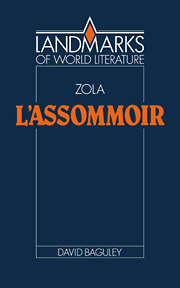4 - Repercussions
Published online by Cambridge University Press: 05 June 2012
Summary
The usual way, though not by any means necessarily the best way, to measure the success and to judge the impact of a literary work in the immediate context of its publication is to examine the reactions of critics. Their opinions, reflecting rival interests and ideologies, are invariably divided and, very often, the louder their protestations, the more acerbic their criticism, the more likely the work proves to be a lasting success. We have already looked at the revealing division of opinion amongst critics on political grounds. Less significant and more predictable were the expressions of moral outrage that the novel provoked, though if they reveal little about the qualities or faults of the novel, they reveal much about official standards of the age. If should be remembered that, until June 1877, the year of publication of L'Assommoir, the French Republic was still largely under monarchist control, and ‘the moral order’ was very much the order of the day. La Fontaine's tales and Casanova's memoirs had recently been banned. The writers in vogue were the tepid, moralistic Victor Cherbuliez and Octave Feuillet. Thus violent protests of indignation from conservative critics were hardly surprising. Albert Millaud, in Le Figaro of 1 September 1876, denounced Zola's novel even before its publication was complete: ‘It is not realism, it is smut; it is not crudity, it is pornography.’
- Type
- Chapter
- Information
- Emile Zola: L'Assommoir , pp. 97 - 110Publisher: Cambridge University PressPrint publication year: 1992



